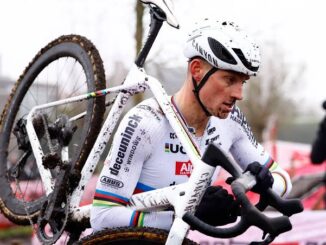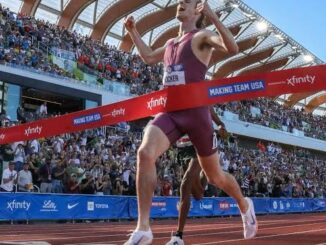
“NETFLIX and Teammates are free to tell me if they think I’ve done something wrong” – Mathieu Van Poel’s advice on how to be a good team leader of the…
In professional cycling, leadership is as crucial as physical ability. A great leader does not only excel in the saddle but also cultivates trust, communication, and camaraderie among teammates. Mathieu van der Poel, one of the most accomplished riders in the peloton, has demonstrated his leadership both on and off the bike. His perspective on being a good team leader is rooted in openness, respect, and a sense of collective purpose.
Van der Poel, who comes from a family deeply entrenched in cycling, has always been a standout talent, winning prestigious races such as the Tour of Flanders and the UCI World Cyclocross Championship. But beyond his talent, he is respected for the way he leads his team. In interviews and statements, van der Poel has shared invaluable insights on leadership and the dynamics within a professional cycling team.
The Importance of Open Communication
One of van der Poel’s key pieces of advice for being an effective team leader is the importance of open communication. “NETFLIX and teammates are free to tell me if they think I’ve done something wrong,” he says, highlighting his willingness to receive constructive criticism. This openness is a cornerstone of good leadership. A team leader who fosters an environment where members feel comfortable expressing their thoughts and opinions is more likely to create a cohesive, well-functioning group.
In the high-stakes environment of professional cycling, the success of a team depends not just on the riders but on how they work together. Team dynamics often determine the outcome of races, and van der Poel recognizes the significance of ensuring that everyone on the team can voice their concerns or suggestions. Leaders who are receptive to feedback from their teammates create an atmosphere of trust and respect.
This approach goes beyond just a tactical discussion of race strategies. It also involves personal relationships and respect for each individual’s role within the team. A leader who listens, rather than dismisses others’ ideas, fosters better decision-making and improves team morale. The better the communication, the more likely the team will perform well under pressure.
Mutual Trust and Respect
Trust is a fundamental pillar of van der Poel’s leadership philosophy. Without trust, no team can function effectively, regardless of the individual talent of its members. A leader must not only trust their teammates but also trust that they will give their best effort for the team. Van der Poel knows that his success as a rider is intertwined with the support of his teammates. In return, he makes it a point to show confidence in their abilities.
“It’s not just about what I do in the race,” he explains. “It’s about everyone playing their part. A good leader brings the best out of others, and this starts with trusting them.” He acknowledges the vital role each rider plays, whether as a domestique helping to set up a sprint or as a key helper in protecting the leader in the early stages of a race. This trust-based dynamic creates a system where everyone is motivated to contribute their utmost.
A strong leader like van der Poel also leads by example. His actions in the peloton inspire his teammates, and they know they can rely on him to give everything in pursuit of victory. Leadership is not only about directing others but also about demonstrating commitment, dedication, and selflessness. Van der Poel’s on-the-road actions speak volumes; he has shown time and again that he is not afraid to sacrifice his own chances to benefit the team.
The Role of Adaptability
Another piece of van der Poel’s leadership advice is adaptability. In the unpredictable world of professional cycling, race plans are often subject to change due to unforeseen events, such as crashes, mechanical failures, or changes in weather conditions. A good leader must be able to adjust tactics quickly and guide the team through these challenges.
“Plans can change in an instant,” says van der Poel. “It’s important to remain calm and adapt.” His ability to stay level-headed and recalibrate during chaotic moments exemplifies his leadership qualities. Whether in a sprint finish or in navigating a challenging climb, van der Poel’s decision-making ability under pressure is a key aspect of his leadership.
When a team is in the midst of a crisis or a critical moment in a race, the leader’s response can either calm the situation or escalate the tension. A leader who can think on their feet and make quick, informed decisions can maintain the team’s focus and confidence. This adaptability ensures that the team can regroup after a setback, whether it’s a mechanical problem, a lost position, or a mistake.
Creating a Positive Team Environment
Finally, Mathieu van der Poel stresses the importance of a positive team environment. A successful leader understands that maintaining a positive attitude within the team helps to foster motivation and a sense of unity. Van der Poel’s ability to inspire his teammates does not come from dominating every decision or always being in the spotlight, but from his capacity to uplift others and celebrate their contributions.
“Cycling is hard,” van der Poel admits. “But having fun with the team makes it easier. We work together and enjoy the challenge.” A positive atmosphere allows riders to be themselves, support each other, and push their limits without fear of judgment. This sense of camaraderie strengthens the overall team dynamic and makes the team more resilient in difficult situations.
A positive team environment can also lead to better individual performances. When teammates feel valued and motivated, they are more likely to give their best in key moments, whether it’s pacing in the early stages of a race or delivering a perfect lead-out in the final sprint. The ability to maintain morale and unity within a team is just as crucial as physical strength.
Conclusion
Mathieu van der Poel’s advice on being a good team leader highlights the importance of open communication, mutual trust, adaptability, and fostering a positive team environment. His leadership style demonstrates that cycling is not just about individual triumphs but about collaboration and collective effort. By leading with empathy, openness, and respect, van der Poel has become a rider who not only achieves great success but also elevates his teammates. His leadership serves as a model for others in the sport, showing that the best leaders are those who bring out the best in others, both in victory and defeat.



Be the first to comment